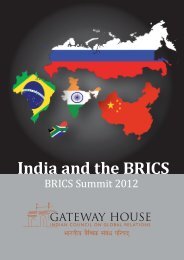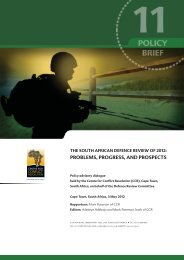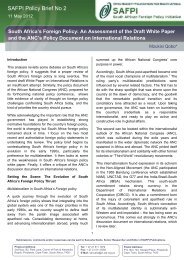A N A L Y S I Sc<strong>on</strong>tinent. How to avoid such scenarios should be theoverriding c<strong>on</strong>cern of <str<strong>on</strong>g>Africa</str<strong>on</strong>g>’s political and ec<strong>on</strong>omic elite.The crucial challenge for <str<strong>on</strong>g>Africa</str<strong>on</strong>g> today is to see that the newscramble for <str<strong>on</strong>g>Africa</str<strong>on</strong>g> is managed to the benefit of <str<strong>on</strong>g>Africa</str<strong>on</strong>g>.The real danger to <str<strong>on</strong>g>Africa</str<strong>on</strong>g> today does not come from thecompetiti<strong>on</strong> am<strong>on</strong>g <strong>emerging</strong> <strong>powers</strong> in <str<strong>on</strong>g>Africa</str<strong>on</strong>g> but from thereal danger of c<strong>on</strong>fr<strong>on</strong>tati<strong>on</strong> between China and the UnitedStates in <str<strong>on</strong>g>Africa</str<strong>on</strong>g> and the more general threat of proxy wars andpolitical instability occasi<strong>on</strong>ed by the race for <str<strong>on</strong>g>Africa</str<strong>on</strong>g>’sresources. For <str<strong>on</strong>g>Africa</str<strong>on</strong>g> to develop its political elites must buildthe political will to pursue a comprehensive developmentagenda that benefits their citizens. Such a political will canemerge when the political elite are kept in check by a pluralpolitical system and/or an independent robust nati<strong>on</strong>al civilsociety. Where this does not exist, as in many <str<strong>on</strong>g>Africa</str<strong>on</strong>g>ncountries today, these political elites easily become proxies forforeign <strong>powers</strong> and interests, whether traditi<strong>on</strong>al or <strong>emerging</strong>external <strong>powers</strong>.Besides, the <str<strong>on</strong>g>Africa</str<strong>on</strong>g>n political elite should have to be muchmore cohesive at the c<strong>on</strong>tinental level if they are to be able touse the competitive internati<strong>on</strong>al envir<strong>on</strong>ment to theircollective advantage. Such cohesi<strong>on</strong> could emerge frominitiatives towards greater c<strong>on</strong>tinental unity and integrati<strong>on</strong>and models of a pan-<str<strong>on</strong>g>Africa</str<strong>on</strong>g>n soluti<strong>on</strong> in the form of a Uni<strong>on</strong>Government for <str<strong>on</strong>g>Africa</str<strong>on</strong>g> or a United States of <str<strong>on</strong>g>Africa</str<strong>on</strong>g>, whichmay be l<strong>on</strong>g-term aspirati<strong>on</strong>. To start with, at least a charterof rights governing investments and engagements <strong>on</strong> thec<strong>on</strong>tinent would be necessary. Such a Charter which wouldhave to be negotiated in the <str<strong>on</strong>g>Africa</str<strong>on</strong>g>n Uni<strong>on</strong> (AU), couldsupercede bilateral agreements and force all external, andperhaps even c<strong>on</strong>tinental, <strong>powers</strong> to agree to a specific set ofbusiness and diplomatic codes of c<strong>on</strong>duct. If AU could agreeto such a charter, it could be subsequently ratified in the UN,thereby extending and strengthening its instituti<strong>on</strong>alisati<strong>on</strong>,and enhancing the reach of its compliance.c<strong>on</strong>cluSi<strong>on</strong>The rise of China, India, Brazil and other <strong>emerging</strong><strong>powers</strong> is the definitive ec<strong>on</strong>omic and political story ofour time. Nowhere is this more apparent than in <str<strong>on</strong>g>Africa</str<strong>on</strong>g>.The accelerated engagement of these <strong>powers</strong> in <str<strong>on</strong>g>Africa</str<strong>on</strong>g>in recent years presents both threats and opportunitiesfor <str<strong>on</strong>g>Africa</str<strong>on</strong>g>. China is the key <strong>emerging</strong> power which makesthe most extravagant claim of formulating a relati<strong>on</strong>shipthat is strategic in its aims, equitable in its politicalengagement and founded <strong>on</strong> the noti<strong>on</strong> of a comm<strong>on</strong>c<strong>on</strong>cepti<strong>on</strong> of political history. However, some <str<strong>on</strong>g>Africa</str<strong>on</strong>g>n andother critics point to the manner in which China’s tradewith <str<strong>on</strong>g>Africa</str<strong>on</strong>g> replicates features of traditi<strong>on</strong>al Westerncol<strong>on</strong>ial trade for <str<strong>on</strong>g>Africa</str<strong>on</strong>g>n resources in exchange formanufactured goods.Despite its l<strong>on</strong>gstanding political and socio-ec<strong>on</strong>omicengagement, India’s recent active drive for acceleratedengagement in <str<strong>on</strong>g>Africa</str<strong>on</strong>g> is relatively new. There is littleevidence that New Delhi aspires to play the c<strong>on</strong>tinent-widerole. In the case of Brazil, despite the pressure to deeepenits involvement in <str<strong>on</strong>g>Africa</str<strong>on</strong>g>, much of what has been d<strong>on</strong>e stillreflects Brasilia’s primary c<strong>on</strong>cern for integrating its <str<strong>on</strong>g>Africa</str<strong>on</strong>g>policy in the service of broader foreign policy objectives.C<strong>on</strong>currently, the focus <strong>on</strong> Lusoph<strong>on</strong>e <str<strong>on</strong>g>Africa</str<strong>on</strong>g>, where Brazilarguably has an advantage over other external actors, ensuresa neat juxtapositi<strong>on</strong> between the cultural-historicaldimensi<strong>on</strong> of Brazil’s <str<strong>on</strong>g>Africa</str<strong>on</strong>g> policy and its currentcommercial interests.As the leading <strong>emerging</strong> power in <str<strong>on</strong>g>Africa</str<strong>on</strong>g>, China seemsto be setting the pace and example for India and Brazil whohave, to varying degrees, adopted the elements of theChinese approach to <str<strong>on</strong>g>Africa</str<strong>on</strong>g>. Western dominati<strong>on</strong>, be itcommercial or otherwise, is waning in <str<strong>on</strong>g>Africa</str<strong>on</strong>g>; but theselective engagement of the United States and the residualpresence of European interests will remain a feature ofThe under-c<strong>on</strong>structi<strong>on</strong> site of a stadium in Georgetown, Guyana, which is being built by India’s real estate company Shapoorji Pal<strong>on</strong>ji.26August 2011-January 2012
A F R I C A Q U A R T E R L Yexternal relati<strong>on</strong>s of <str<strong>on</strong>g>Africa</str<strong>on</strong>g>n states. It may also be said thatall the countries involved in the new scramble for <str<strong>on</strong>g>Africa</str<strong>on</strong>g> aredriven largely by nati<strong>on</strong>al interest, and that their behaviouris c<strong>on</strong>diti<strong>on</strong>ed far more by competiti<strong>on</strong> with each otherthan by the noble sentiments enshrined in their policy documentsand press releases. There are lurking dangers inherentin the new scramble, the possibility of repeating theresults of previous scrambles: neo-col<strong>on</strong>ial relati<strong>on</strong>s, proxywars, and ultimately political instability and ec<strong>on</strong>omic devastati<strong>on</strong>.However, it must be stressed that <str<strong>on</strong>g>Africa</str<strong>on</strong>g> must leverageits new partnership with China and other <strong>emerging</strong> <strong>powers</strong>in the interest of its own l<strong>on</strong>g-term development. For that,<str<strong>on</strong>g>Africa</str<strong>on</strong>g>ns should develop a collective l<strong>on</strong>g-term perspectivein its relati<strong>on</strong>s with external <strong>powers</strong>. Collective strategies areneeded to effectively utilise external capital, training andinvestment for <str<strong>on</strong>g>Africa</str<strong>on</strong>g>’s ec<strong>on</strong>omic development. <str<strong>on</strong>g>Africa</str<strong>on</strong>g>npolitical elites will have to be much more cohesive at thec<strong>on</strong>tinental level if they are to be able to use the competitiveinternati<strong>on</strong>al envir<strong>on</strong>ment to their collective advantage.<str<strong>on</strong>g>Africa</str<strong>on</strong>g>n leaders also need to engage <strong>emerging</strong> <strong>powers</strong> moreproactively in terms of <str<strong>on</strong>g>Africa</str<strong>on</strong>g>’s own needs, demands andaspirati<strong>on</strong>s.The rapid growth of <strong>emerging</strong> <strong>powers</strong> is also an exampleof the fact that poor societies can rise bey<strong>on</strong>d col<strong>on</strong>ialexploitati<strong>on</strong> and the mangled priorities of societies whichensure that col<strong>on</strong>ial societies c<strong>on</strong>tinue to remain producersof raw materials.These <strong>emerging</strong> <strong>powers</strong> broke with the old models ofaccumulati<strong>on</strong> and the changes in their ec<strong>on</strong>omies led to anbetter standard of living for their people. The growingpartnership of <strong>emerging</strong> <strong>powers</strong> with <str<strong>on</strong>g>Africa</str<strong>on</strong>g> has great potentialto break pre-existing failed development paradigms byfocusing <strong>on</strong> trade and investment and promoti<strong>on</strong> of genuineSouth-South cooperati<strong>on</strong>.The <strong>on</strong>ly way this objective could be reached is for<str<strong>on</strong>g>Africa</str<strong>on</strong>g>n leaders themselves to take charge of their owndestiny. This would require these leaders to be willing to playforeign <strong>powers</strong> against each other to obtain the best terms fortheir own comprehensive development in the first place,and they would need the instituti<strong>on</strong>al capacity to manage theforeign relati<strong>on</strong>s to achieve this. Both these prec<strong>on</strong>diti<strong>on</strong>swould also require a united political elite <strong>on</strong> the c<strong>on</strong>tinent.Only then can the c<strong>on</strong>tinent begin to lay the foundati<strong>on</strong>s forthe realisati<strong>on</strong> of the l<strong>on</strong>g-standing dream of many <str<strong>on</strong>g>Africa</str<strong>on</strong>g>nleaders to make the 21st century, the <str<strong>on</strong>g>Africa</str<strong>on</strong>g>n century. nReferences1. Alden, C., China in <str<strong>on</strong>g>Africa</str<strong>on</strong>g>, L<strong>on</strong>d<strong>on</strong>, Zed Books, 20072. Alden, C., and Alves, A., ‘History and Identity in theC<strong>on</strong>structi<strong>on</strong> of China’s <str<strong>on</strong>g>Africa</str<strong>on</strong>g> Policy’, Review of <str<strong>on</strong>g>Africa</str<strong>on</strong>g>n3. Political Ec<strong>on</strong>omy, 35 (115): 43 – 584. Ampiah, K. and Naidu, S., Crouching Tiger, HiddenDrag<strong>on</strong>? <str<strong>on</strong>g>Africa</str<strong>on</strong>g> and China, Cape Town, KwaZulu NatalPress, 20085. Beri, Ruchita, “China’s Rising Profile in <str<strong>on</strong>g>Africa</str<strong>on</strong>g>”, ChinaReport, Vol.43, No. 3, 20076. Braughtigam, D., The Drag<strong>on</strong>’s Gift: The Real Story ofChina in <str<strong>on</strong>g>Africa</str<strong>on</strong>g>, Oxford, Oxford University Press, 20097. Broadman, H.G., <str<strong>on</strong>g>Africa</str<strong>on</strong>g>’s Silk Road: China and India’sNew Ec<strong>on</strong>omic Fr<strong>on</strong>tier, Washingt<strong>on</strong>, World Bank, 20068. Campbell, H., China in <str<strong>on</strong>g>Africa</str<strong>on</strong>g>: ‘Challenging U.S. GlobalHegem<strong>on</strong>y’, Third World Quarterly, 29(1), 2008: 89 – 1059. Chand, Manish (ed.) Two Billi<strong>on</strong> Dreams: CelebratingIndia-<str<strong>on</strong>g>Africa</str<strong>on</strong>g> Friendship, New Delhi, IANS Publishing, 201110. Cheru, Fantu., <str<strong>on</strong>g>Africa</str<strong>on</strong>g>n Renaissance: Roadmaps to theChallenge of Globalizati<strong>on</strong>, L<strong>on</strong>d<strong>on</strong>, Zed Books, 200211. Cheru, Fantu and Obi, Cyril., (eds.) The Rise of Chinaand India in <str<strong>on</strong>g>Africa</str<strong>on</strong>g>, Nordic <str<strong>on</strong>g>Africa</str<strong>on</strong>g> Institute, Zed Books,L<strong>on</strong>d<strong>on</strong>, New York, 201012. Cornelissen, S., Cheru. F., and Shaw, T.M.,(eds.) <str<strong>on</strong>g>Africa</str<strong>on</strong>g>and Internati<strong>on</strong>al Relati<strong>on</strong>s in the 21st Century, Palgrave,Macmillan, 201213. Davis, M., ‘China’s Developmental Model comes to<str<strong>on</strong>g>Africa</str<strong>on</strong>g>’, Review of <str<strong>on</strong>g>Africa</str<strong>on</strong>g>n Political Ec<strong>on</strong>omy 35 (1) 2008:134-714. He Wen Ping, “China’s <str<strong>on</strong>g>Africa</str<strong>on</strong>g> Policy: Driving Forces,Features and Global Impact”, <str<strong>on</strong>g>Africa</str<strong>on</strong>g> Review (ASA, NewDelhi) vol. 1., No.1, 2009: 35-5316. Ikenberry, J.G., “The Rise of China and the Future ofthe West”, Foreign Affairs, (New York), Vol. 87,, No.1,January/February 200817. Large, Daniel, “Bey<strong>on</strong>d Drag<strong>on</strong> in the Bush: The Studyof China-<str<strong>on</strong>g>Africa</str<strong>on</strong>g> Relati<strong>on</strong>s”, <str<strong>on</strong>g>Africa</str<strong>on</strong>g>n Affairs (L<strong>on</strong>d<strong>on</strong>) Vol.107, No. 426, 200818. Lahiri, Dilip, Schultz, Jorg and Chand, Manish,Engaging with Resurgent <str<strong>on</strong>g>Africa</str<strong>on</strong>g>, New Delhi, MacmillanPublishers, India, 201119. Mathews, K., India <str<strong>on</strong>g>Africa</str<strong>on</strong>g> Cooperati<strong>on</strong>: A StrategicVisi<strong>on</strong>, <str<strong>on</strong>g>Africa</str<strong>on</strong>g> Quarterly, Vol. 51, No. 1, 2011: 36-4720. Mawdsley, Emma and McCann, Gerard, (ed.) India in<str<strong>on</strong>g>Africa</str<strong>on</strong>g>: Changing Geographies of Power, Pambazuka Press,Cape town, Nairobi, 201121. Sharma, Anand, ‘India and <str<strong>on</strong>g>Africa</str<strong>on</strong>g>: Sharing RobustPartnership’, in Beri, Ruchita and Sinha, Uttam (eds) <str<strong>on</strong>g>Africa</str<strong>on</strong>g>and Energy Security: Global Issues, Local Resp<strong>on</strong>ses, NewDelhi, Academic Foundati<strong>on</strong>, 200922. Tull, D.M., “China’s Engagement With <str<strong>on</strong>g>Africa</str<strong>on</strong>g>: Scope,Significance and C<strong>on</strong>sequences”, Journal of Modern<str<strong>on</strong>g>Africa</str<strong>on</strong>g>n Studies, No. 44 (3), 200623. Vines, Alex, “China in <str<strong>on</strong>g>Africa</str<strong>on</strong>g>: Mixed Blessing”, CurrentHistory, May 200724. Zakaria, Fareed, The Post-American World, PenguinBooks, L<strong>on</strong>d<strong>on</strong>, 2009August 2011-January 2012 27





